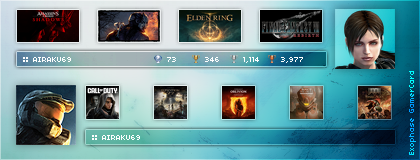| JWeinCom said: You say that the war between organics and synthetics will continue in any ending besides synthesis. This is absolutely not supported by the text (the game). The most prominent example of a war between synthetics and organics is that between the geth and quarians. And, depending on what you do, you can create a peaceful resolution to this conflict. The other most prominent example is Edi, and you are, even without the synthesis ending, able to coexist peacefully with her. The main proponent of synthesis is Saren, and you are able to convince him he is wrong to the point where he commits suicide. In the ending, the three choices each have a representative. The synthesis ending is repped by Saren, the control by the illusive man, and destroy by anderson. You spend the first game fighting against synthesis, the second fighting against control. You can convince both Sareen and the Illusive man to kill themselves because they're so wrong about their ideas. So, destruction seems more reasonable in that light. The destruction ending is the only one that has an extra scene at the end as well which is typical of the "true" ending in a game. "I respect your perception of the story and I do not wished to call you wrong on the matter. However.... I think arguing with the writers and developers of the series is rather... silly. They certainly know the story better than you,, or any of us will." Perhaps you do not want to call people out for being wrong, however I am perfectly happy to respectfully tell people when they are wrong. You are wrong. First of all, the human mind is not a static thing. Minds decline, even those of authors. There is no guarantee that the author will not change their mind over their interpretation, or that they will remain in a stable state of mind. People can lie, be misinterpreted, forget, say conflicting things, or get drunk. For example, George Lucas has given several conflicting comments on whether or not Han solo shot first in Star Wars a new hope. So, if you're going by the author's intentions, you'll have to believe contradictory things, or change your interpretation on their whims. |
Where to start with this.
I'll go with the simple one. "But the peace will not last" This quote clearly sums up the endings and states that the peace between synthetics and organics will only be a temporary one.
I would love to admit that I was wrong. But I am afraid that it is you that is wrong in this matter. You may have an English degree, but I can claim that I do my own writing anomalously, which I do, and that I have a strong understanding of philosophy, which I also do. I studied what a lot of philosophy and A.I. as a form of intelligent life and becoming self-aware is one of the studies in university. I had to write one hell of an essay on that.
You also seem to assume that it was one person that I talked to that works at Bioware. That would be incorrect. I talked to 7 to be precise. Two of them being founding fathers. So no. I actually will call you out on this. Secondly, no I probably shouldn't give names nor should I say anything else other than what I stated in my earlier post. As such is information that is "fine" to spew around. You are not inclined to believe what I say if you do not wish, that doesn't change anything.
As far as Luca's goes. He did re-edit the story and it is Greedo that shot first. We just like the idea of Han shooting first and so we remain stubborn and keep that in our minds. We are wrong to think this, but ignorance is bliss. This is no different than the case at hand. The whole Casey Hudson stating that Mass Effect 3 is about masturbation is just straight up stupid and irrelavent. Casey Hudson is the director of the series and was not the main writer. He did have a lot of control over the story and major key points. Everything went through him and he had major control over the series. The writers were Drew Karpyshyn for Mass Effect and Mass effect 2. And Mac Walters for Mass Effect 2 and Mass Effect 3. If you can't even get this right.... then why are you arguing? The writer is often always right when it comes to their universe. Even if our minds wish to think otherwise, or perceive otherwise. Just because it's bloated with plot points, doesn't change the main theme of the game. Theme would be the proper word I should have used, rather than main plot. For that, I can accept my fault. That was an error on my part.

















